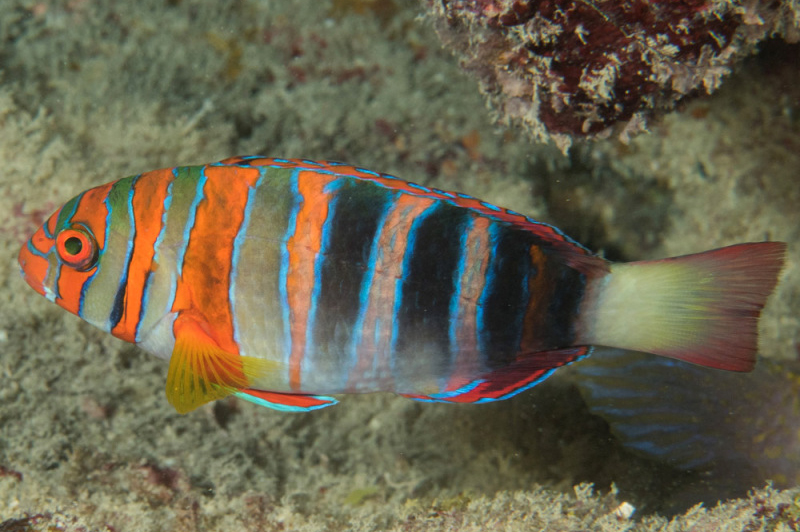- Classification
- ACTINOPTERYGII
- PERCIFORMES
- LABRIDAE
- Choerodon
- fasciatus
Harlequin Tuskfish, Choerodon fasciatus (Günther 1867)

A Harlequin Tuskfish, Choerodon fasciatus, at Lizard Island, Great Barrier Reef, Queensland. Source: Rick Stuart-Smith, Reef Life Survey / Lizard Island Field Guide, http://lifg.australianmuseum.net.au/. License: CC by Attribution
A colourful and easily recognised wrasse with 7 or 8 pairs of prominent alternating orange to reddish, blue, white and blackish bands. Juveniles have brownish banding and ocelli in the dorsal and anal fins.
Harlequin Tuskfish have blue teeth!
Video of a harlequin Tuskfish in the Great Barrier Reef Aquarium, Reef HQ, Townsville, Queensland
Harlequin Tuskfish, Choerodon fasciatus (Günther 1867)
More Info
|
Distribution |
Known in Australia from Cape York to Moreton Bay, QLD. Elsewhere, in the West Pacific, and common in parts of its range. |
|
Feeding |
benthic invertebrates including molluscs, crustaceans, polychaete worms and echinoderms. |
|
Biology |
Reportedly forms monogamous pairs. |
|
Fisheries |
The taking of this species is regulated in Queensland waters. |
|
Species Citation |
Xiphochilus fasciatus Günther 1867, Proc. Zool. Soc. London 1867: 101. Type locality: Cape York, QLD. |
|
Author |
Dianne J. Bray |
Harlequin Tuskfish, Choerodon fasciatus (Günther 1867)
References
Allen, G.R. 1997. Marine Fishes of Tropical Australia and South-east Asia. Western Australian Museum. 292 pp.
Allen, G.R. & Erdmann, M.V. 2012. Reef fishes of the East Indies. Perth : Tropical Reef Research 3 vols, 1260 pp.
Francis, M.P., 1993. Checklist of the coastal fishes of Lord Howe, Norfolk, and Kermadec Islands, Southwest Pacific Ocean. Pac. Sci. 47(2): 136-170.
Fulton, C.J., Bellwood, D.R. & Wainwright, P.C. 2001. The relationship between swimming ability and habitat use in wrasses. Marine Biology 139: 25-33.
Grant, E.M. 1991. Fishes of Australia. Brisbane : EM Grant Pty Ltd 480 pp.
Green, A.L. 1996. Spatial, temporal and ontogenetic patterns of habitat use by coral reef fishes (Family Labridae). Marine Ecology Progress Series 133: 1-11.
Günther, A. 1867. Descriptions of some new or little known species of fishes in the collection of the British Museum. Proceedings of the Zoological Society of London 1867: 99-104 pl. 10
Johnson, J.W., 1999. Annotated checklist of the fishes of Moreton Bay, Queensland, Australia. Memoirs of the Queensland Museum 43(2):709-762.
Kuiter, R.H. 1996. Guide to Sea Fishes of Australia. New Holland. 433 pp.
Pollard, J. (ed.) 1980. G.P. Whitley's Handbook of Australian Fishes. North Sydney : Jack Pollard Publishing Pty Ltd 629 pp.
Randall, J.E., 2005. Reef and shore fishes of the South Pacific. New Caledonia to Tahiti and the Pitcairn Islands. University of Hawaii Press, Honolulu, Hawaii. 720 p.
Randall, J.E., Allen, G.R. & Steene, R. 1990. Fishes of the Great Barrier Reef and Coral Sea. Bathurst : Crawford House Press 507 pp. figs.
Randall, J.E., Allen, G.R. & R.C. Steene. 1997. Fishes of the Great Barrier Reef and Coral Sea. Crawford House Press. Pp. 557
Ryan, S. & Clarke, K. 2005. Ecological assessment of the Queensland marine aquarium fish fishery. A report to the Australian Government Department of Environment and Heritage on the ecologically sustainable management of the Queensland marine aquarium harvest fishery.
Westneat, M.W. 2001. Labridae. pp. 3381-3467 in Carpenter, K.E. & Niem, T.H. (eds). The Living Marine Resources of the Western Central Pacific. FAO Species Identification Guide for Fisheries Purposes. Rome : FAO Vol. 6 pp. 3381-4218.
Whiteman, E.A. & Côté, I.M. 2004. Monogamy in marine fishes. Biological Reviews 79: 351-375.






